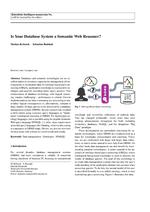Is Your Database System a Semantic Web Reasoner?
From International Center for Computational Logic
Is Your Database System a Semantic Web Reasoner?
Markus KrötzschMarkus Krötzsch, Sebastian RudolphSebastian Rudolph
Markus Krötzsch, Sebastian Rudolph
Is Your Database System a Semantic Web Reasoner?
KI, 30(2):169-176, 2016
Is Your Database System a Semantic Web Reasoner?
KI, 30(2):169-176, 2016
- KurzfassungAbstract
Databases and semantic technologies are an excellent match in scenarios requiring the management of heterogeneous or incomplete data. In ontology-based query answering, application knowledge is expressed in ontologies and used for providing better query answers. This enhancement of database technology with logical reasoning remains challenging—performance is critical. Current implementations use time-consuming pre-processing to materialise logical consequences or, alternatively, compute a large number of large queries to be answered by a database management system (DBMS). Recent research has revealed a third option using recursive query languages to “implement” ontological reasoning in DBMS. For lightweight ontology languages, this is possible using the popular Semantic Web query language SPARQL 1.1, other cases require more powerful query languages like Datalog, which is also seeing a renaissance in DBMS today. Herein, we give an overview of these areas with a focus on recent trends and results. - Projekt:Project: DIAMOND, HAEC B08
- Forschungsgruppe:Research Group: Computational LogicComputational Logic, Wissensbasierte SystemeKnowledge-Based Systems
@article{KR2016,
author = {Markus Kr{\"{o}}tzsch and Sebastian Rudolph},
title = {Is Your Database System a Semantic Web Reasoner?},
journal = {KI},
volume = {30},
number = {2},
publisher = {Springer},
year = {2016},
pages = {169-176},
doi = {10.1007/s13218-015-0412-x}
}
